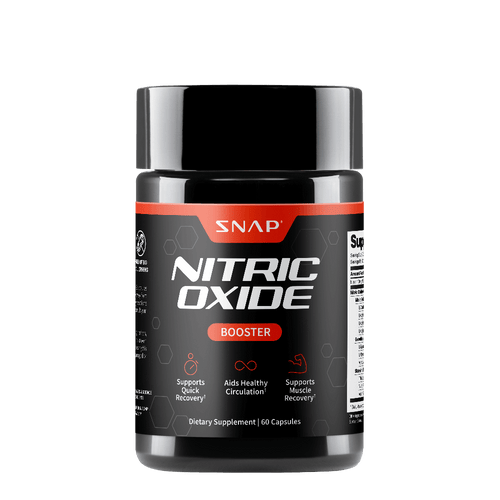Exploring the Connection Between Diabetes and Nitric Oxide
Diabetes and heart disease are two of the leading causes of death and disability in the United States—and the relationship between these chronic diseases is not lost on the experts¹.
According to the American Heart Association, adults with diabetes are 2-4 times more likely to die from heart disease than those who do not have diabetes².
High blood pressure—or hypertension—is one of the top contributors to diabetes-related cardiovascular complications². Over time, chronically elevated blood sugar can damage your body’s delicate blood vessels. This tissue damage contributes to arterial plaque formation and narrowing of blood vessels which limits blood flow and subsequently leads to increases in blood pressure².
But there may be more to it than that.
Recent research has identified another potential key player in the complex relationship between diabetes and heart disease: nitric oxide.
Several studies suggest that people with diabetes may have a diminished cellular ability to produce nitric oxide³⁴. The reduced availability of this important molecule may play a role in increasing risk for developing high blood pressure and heart disease.
What is Nitric Oxide?
Nitric Oxide (NO) is a gaseous chemical compound derived from the amino acid L-arginine and an enzyme known as Nitric Oxide synthase (NOS). It is made up of one atom of nitrogen bound with one atom of oxygen³.
Nitric oxide is produced by various cells throughout the body where it functions as a messenger molecule. NO tells the smooth muscle cells within your blood vessels to relax and open, allowing for improved blood flow, increased tissue oxygenation, and reduced blood pressure⁵.
The importance of adequate nitric oxide availability for maintenance of cardiovascular health is undeniable. In fact, not long after its discovery, nitric oxide was named “Molecule of the Year” by the American Academy for the Advancement of Science in 1992.

Nitric Oxide Booster (60ct)
$41.00
Tips For Improving Nitric Oxide Production
Although having chronic diseases like diabetes may impede your body’s ability to produce nitric oxide, there are several simple strategies you can use to naturally enhance NO production and availability.
1. Eat Vegetables High in Nitrates
If you have diabetes you’re probably well aware that your dietary choices can impact your blood sugar, but what you may not know is that certain foods can also support nitric oxide production.
Nitrates found in vegetables can function as a precursor to nitric oxide, thus, higher intake of nitrate-rich veggies encourages increased nitric oxide levels in the body⁶.
Beets, celery, spinach, arugula, and other dark leafy greens are among the richest sources of dietary nitrates⁶. Aim to include these foods in your diet each day for maximum benefit.
2. Exercise
Engaging in regular physical activity is another great way to support Nitric Oxide production and improve overall heart health.
Exercise stimulates an increase in nitric oxide production by blood vessel cells which then dilates vessels, improves circulation, and increases efficiency of oxygen delivery throughout the body⁷.
Physical activity also supports increased insulin sensitivity which is critical for both blood sugar control and nitric oxide production⁸.
The American Heart Association recommends getting at least 150 minutes of moderate-intensity aerobic exercise per week.¹⁰
3. Supplements
Certain nutritional supplements may also be helpful for increasing nitric oxide production such as:
- L-Arginine
Research indicates that Nitric Oxide precursor L-arginine may aid in improving blood flow and lowering blood pressure for people with pre-existing hypertension¹¹.
- L- Citrulline
L-citrulline is a byproduct of Nitric Oxide metabolism that can be recycled to produce additional nitric oxide. Some studies suggest supplementation with L-citrulline may be beneficial for enhancing blood flow and improving cardiovascular performance¹².
- Beetroot Supplements
If you’re not a fan of eating beets, but still want their nitric-oxide boosting benefits, you may want to try consuming Nitric Oxide Beets instead. Several studies have found that supplementation with beetroot can increase blood levels of nitrates which may contribute to reduced blood pressure and increased blood flow¹³.
NCBI & CDC Sources Here:
- https://www.cdc.gov/chronicdisease/about/index.htm
- https://www.heart.org/en/health-topics/diabetes/why-diabetes-matters/cardiovascular-disease--diabetes
- https://diabetes.diabetesjournals.org/content/62/8/2645
- https://www.ncbi.nlm.nih.gov/pubmed/20484137
- https://www.ncbi.nlm.nih.gov/pubmed/27974299
- https://www.ncbi.nlm.nih.gov/pubmed/19439460
- https://academic.oup.com/ajh/article/20/8/825/182351
- https://www.ncbi.nlm.nih.gov/pubmed/28879026
- https://www.ncbi.nlm.nih.gov/pubmed/17551000
- https://www.heart.org/en/healthy-living/fitness/fitness-basics/aha-recs-for-physical-activity-infographic
- https://www.ncbi.nlm.nih.gov/pubmed/27660594
- https://www.ncbi.nlm.nih.gov/pubmed/27749691
- https://www.ncbi.nlm.nih.gov/pubmed/31336633